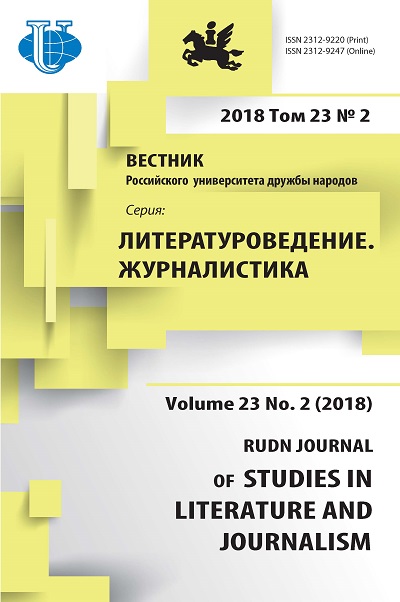THE CONCEPTS OF HISTORICAL AND NON-HISTORICAL IN AESTHETIC AND PHILOSOPHICAL SYSTEM OF THE NOVEL “THE AVIATOR” BY E. VODOLAZKIN
- Authors: Bochkina M.V.1, Golubkov M.M.1
-
Affiliations:
- Lomonosov Moscow State University
- Issue: Vol 23, No 2 (2018)
- Pages: 188-197
- Section: LITERARY CRITICISM
- URL: https://journals.rudn.ru/literary-criticism/article/view/18784
- DOI: https://doi.org/10.22363/2312-9220-2018-23-2-188-197
- ID: 18784
Cite item
Full Text
Abstract
The article reviews correlation between the concepts of historical and non-historical which form the author’s artistic philosophy in E. Vodolazkin’s novel “The Aviator”. The interpretation of historical process in the novel is analyzed in the context of theories by M. Blok, A. Gurevich, B. Uspensky as well as philological works by E. Vodolazkin which help to characterize the author’s intent with better precision. The reflections about time and history occupy an important part in The Aviator, the concept is being formed both from the viewpoint of the main character Innokenty as well as in the polylog of the collective diary writings. The main source of the concept is the whole complex of E. Vodolazkin’s scientific views consistently stated in his work World History in the Literature of Ancient Rus (based on the material of chronographic and the Palaea narrative of the XI-XV centuries).
Keywords
About the authors
Mariia Vasilevna Bochkina
Lomonosov Moscow State University
Author for correspondence.
Email: marystradivari@mail.ru
PhD student, Department of Russian Literature of the XX century and contemporary literary process, Philological faculty, Lomonosov Moscow State University
GSP-1, Leninskie Gory, Moscow, 119991, Russian FederationMikhail Mikhailovich Golubkov
Lomonosov Moscow State University
Email: m.golubkov@list.ru
Doctor of Philology, Professor, head of the Department of Russian Literature of the XX century and contemporary literary process, Philological faculty, Lomonosov Moscow State University
GSP-1, Leninskie Gory, Moscow, 119991, Russian FederationReferences
- Blok M. Apologiya istorii, ili Remeslo istorika [Apology in history. Or historical craft]. M.: Nauka, 1986. S. 15—19.
- Vodolazkin E.G. Aviator [The Aviator]. M.: AST;Redaktsiya Eleny Shubinoi, 2016. 410 p.
- Vodolazkin E.G. Vsemirnaya istoriya v literature Drevnei Rusi (na materiale khronograficheskogo i paleinogo povestvovaniya XI—XV vv.) [World History in the Literature of Ancient Rus (based on the material of chronographic and the Palaea narrative of the XI—XV centuries)]. 2-e izd., pererab. i dop. SPb.: Pushkinskii dom, 2008. 488 p.
- Gurevich A.Ya. Kategorii srednevekovoi kul’tury [Categories of medieval culture]. 2-e izd., ispr. i dop. M.: Iskusstvo, 1984. 350 p.
- Evgenii Vodolazkin. Available at: http://evgenyvodolazkin.ru/1075_evgenij-vodolazkin-segodnyaobshhestvo-xochet-chitat-sereznuyu-literaturu/ (accessed: 10 February 2018).
- Komsomol’skaya pravda. Available at: https://www.kp.ru/daily/26729.7/3755887/ (accessed: 10 February 2018).
- Kul’tura.RF. Available at: https://www.culture.ru/materials/158683/evgenii-vodolazkin-ya-znalvtorogo-lavra-pisat-nelzya (accessed: 10 February 2018).
- RIA Novosti. Available at: https://ria.ru/interview/20160913/1476775027.html (accessed: 10 February 2018).
- Rossiiskaya gazeta. Available at: https://rg.ru/2016/09/29/vodolazkin-ia-pytaius-v-aviatoresdelat-chitatelia-soavtorom.html (accessed: 10 February 2018).
- Uspenskii B.A. Izbrannye trudy. T. 1. Semiotika istorii. Semiotika kul’tury [Semiotics of history. Semiotics of culture]. M.: Gnozis, 1994. 432 p.
- Jaspers K. Smysl i naznachenie istorii [The Origin and Goal of History]. M.: Politicheskaya literatura, 1991. 530 p.
Supplementary files















